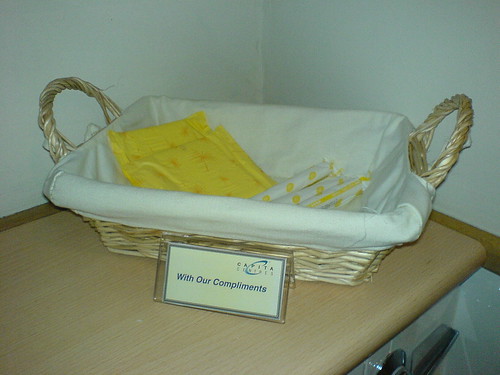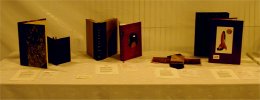Rick Horowitz at Unspun “tagged” me with a questionnaire about books. He thought it would get me blogging again.
The reasons I’m not blogging much aren’t ones that a questionnaire will address. I’m simply too busy right now. I’ve committed to a large number of bindings by early August, for Interaction, the World Science Fiction Convention, to be held in Glasgow this year. I bind in spare bits of time, in evenings and weekends, and this time was formerly blogging time. I will answer the questionnaire, but it won’t get me blogging much again.
My relationship with books is a little more complex than Rick’s. For me, a book is not just a box of words (which is a special enough thing in its own right). I am a bookbinder as well as a reader. Books are things I make, physical structures I love for their own sakes, as well as containers for stories and knowledge. Some of these questions will therefore get two answers, one from me as a reader and one as a binder.
Incipit
1. Total number of books I have owned
Like Rick, I’m going to take this as “total number of books I own.”
Over the years, Martin and I have acquired and disposed of thousands of books. At one particular point in this cycle, we concluded that we could not shelve all of our books at once, and moved to a “catalogue and store” approach, with most of our books boxed up in our loft. I have some doubts as to the accuracy of our catalogue with regard to physical location, but the quantity listed is about right.
According to our catalogue, we have 2255 books between us. I would estimate that there are about 45 books on our shelves that are not catalogued, either because they are recent purchases or because they are bookbinding books (I’ve never got round to cataloguing that collection).
The next question is whether I divide the aggregate total by two, since the books are community property. But we believe that books are shared wealth – we even have a separate budget in our accounting system for book purchases, which do not come out of our personal funds. So I would contend that I own in the region of 2300 books.
2. Last book I bought
The last book that I bought to read was the Penland Book of Handmade Books. It bills itself as a technical book, but most of the things that it describes the makings of are “artists books”, which frequently do not really match my definition of a book at all.
The last book that I bought at all was a Folio Society edition of The Hobbit. I have been rebinding a HarperCollins edition of the book (for the Worldcon art show, at which the evilrooster bindery will be an exhibitor), and I bought this one to compare the bindability. I suspect that I will not love it as well as I do the HarperCollins one, but as a binder, I learn by doing.
3. Last book I’ve read
Atypically, it’s a self-help book. (Usually, I’m too contrary for self-help books). My line manager at work recommended that I read Crucial Conversations, by Kerry Patterson, Joseph Grenny, Ron McMillan and Al Switzer as a book that had had a strong impact on him.
My reaction to the book was mixed. I already do much of what the book recommends, in particular the effort to understand where the other parties in a heated dispute are coming from. It goes on to discuss the ways to find and highlight shared goals between the parties, in order to find common ground. I see these techniques as part of my goal to be a peacemaker, though I don’t use the cheesy business-speak acronyms that the book does to describe them.
So on the one hand, the book gives away my trade secrets. If everyone follows it, then one of my key skills becomes a commonplace. On the other hand, I’d love to see a lot of those techniques applied to the American political scene, where the victory of one party over another seems to have superseded the goal of improving the common good.
4. Five books that mean a lot to me
1. The Bible
I value this book both because I am a Christian, and because I am a member of the Western intellectual tradition. I don’t blog about my faith (not directly, anyway), and if you don’t realise the Bible’s influence on Western culture, I can’t start explaining it here.
Most of the time, I prefer the New Jerusalem Bible, which is one of the Catholic translations. Part of my preference is because it renders the text in a clear and comprehensible way, and contains all of the “apocrypha” that I want in the book. But my other reason for liking it is that JRR Tolkien was one of the original contributors, and that’s just cool.
For the Psalms, Wisdom and the Song of Songs (and, on some days, the Gospel according to John), I find that I turn to the King James Version. Some of the Bible is best read as poetry, not prose, and KJV has never been equalled as a work of art. In short, Shakespeare trumps Tolkien.
And sometimes, when I need to really understand a passage, I go back to the Greek. I have an Oxford University Press edition of the Greek New Testament that is of use at times.
As a binder, I have a standing policy of not rebinding Bibles. They’re rarely well-bound, because the majority of them will never be read much, and it would be too expensive to bind a 1500-page book on tissue-thin paper in a durable fashion. Add to that the emotional impact of messing up someone’s dearly beloved family heirloom, and you can see why I’m just not keen.
(Having said that, I did do a repair on a colleague’s reading Bible, but on the explicit understanding that it might be ugly as long as it preserved the life of the book. He just didn’t want to recopy years of marginal notes if he could avoid it.)
2. The Left Hand of Darkness
My parents read me some interesting books when I was a kid. Ursula K. Le Guin’s novel was one of them. It’s from the 1960’s and 1970’s trend toward intellectual and philisophical science fiction, and is (in my opinion) the best of the breed. As a meditation on gender, alienation, friendship, and politics, it’s always got something to say to me, after over twenty years of rereading. Having a strong plot and good characterisation is a bonus. Therem Harth rem ir Estraven, one of the two main characters, was probably the first literary figure I ever really loved.
Many people don’t like the book, particularly ones more rooted in the action and war trends more popular in science fiction now. Takes all kinds, I guess.
I’ve never bound the book, but if I did, I think I would design a binding showing a night time snow-bound landscape (it takes place on a world gripped by an ice age). The shapes of the land would echo the double curve of a yin-yang symbol, which is an important image in one scene of the book.
The book is also the source of one of my favourite recipies for dealing with problems: When action grows unprofitable, gather information. When information grows uprofitable, sleep.
3. The Secret History
Donna Tartt’s first novel describes a Californian Classics student who travels to an East Coast university, where he becomes caught up in the activities of a close-knit clique. Since those activities include a recreation of a Greek bacchanal, which culminates in a murder, his social life gets a bit complicated.
Tartt knows her Classics, and her Classicists. Many of the fine touches of the book ring very true, from the students’ spurious pedanticism to their use of fountain pens. The characters have clearly been changed by their knowledge of Classical languages, as I was deeply changed by the study of Latin and Greek. And the author herself shows signs of those same changes, in that the book’s plot works equally well in the ancient Greek cosmology as it does in the modern one.
I haven’t bound this book either, nor thought deeply about how I would do so.
4. The Collected Poems of Philip Larkin
This was a gift from my friend James, the first Christmas that I knew him. We were both twenty at the time, and the poet’s angst and faintly defeatest style suited us. He is the master of taking away almost all that he gives the reader, with lines like this from An Arundel Tomb
…the stone fidelity
They hardly meant has come to be
Their final blazon, and to prove
Our almost-instinct almost true:
What will survive of us is love
Another example of what I mean is from Talking in Bed:
At this unique distance from isolation
It becomes still more difficult to find
Words at once true and kind,
Or not untrue and not unkind.
Although I’ve grown up since then, some of what Larkin says still works for me. His poem The Importance of Elsewhere is one of my two favourite mediations on being an expatriate. And I often reread No Road, usually as a counterweight to Robert Frost’s Mending Wall.
5. The Craft of Bookbinding
This book, by Manly Banister, was the bookbinding book that got me into the craft. It was one of two that Martin gave me one Christmas, and it was the one that convinced me that an amateur with woodworking skills could bind books and make bindery equipment. It also showed the difficult parts of binding, unlike many beginning books, which never get past the “learn this in half a day” level of techniques.
It was only later that I discovered that Manly Banister was a pulp science fiction author and fanzine editor.
5. Tag five people and have them do this on their blog
I’m not comfortable doing this, because it feels like placing an obligation on others. I’ll tag one person: Mark, we’ve already discussed this. Can you put a link in the comments section when you’ve done it?
If any of my other readers (whoever you are) feel like doing it too, again, put a link in the comments.
Finit




